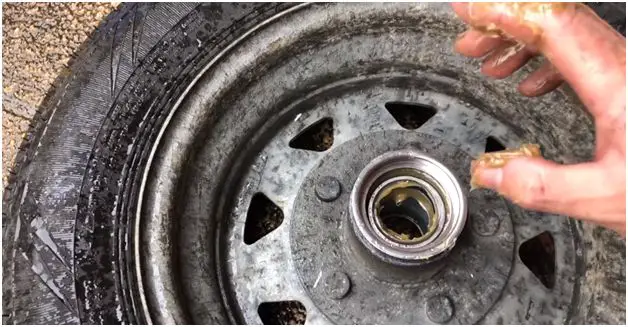Keeping your trailer bearings properly lubricated is crucial to ensuring safe and reliable operation. However, it can be tricky to know exactly when your bearings need fresh grease. Here are some tips on inspecting your bearings and recognizing when it’s time for new grease.
Page Contents
Inspecting Your Bearings
Start by jacking up your trailer and securing it on jack stands. Remove the hub cap, cotter pin, and spindle nut. Pull the hub off the spindle. This will allow you to access and inspect the bearings and races.
Look for any signs of wear or damage on the bearing rollers, races, or cages. Discoloration, pitting, or excessive roughness usually indicates worn out bearings that need replacement. Next, grab the inner and outer bearings and spin them in your hands. They should spin freely and smoothly without resistance or noise.
Inspect the grease on the bearings. It should be clean, smooth, and free of metal flakes or other contaminants. If the grease is very dirty, dry, or gummed up then it’s time to clean and repack the bearings. Even if the bearings look fine, old degraded grease won’t protect them properly.
Recognizing When to Regrease
Here are some key signs that your trailer wheel bearings need fresh grease:
- It’s been more than a year or 12,000 miles since your last repacking
- You submerged the wheel hub in water while launching your boat
- The bearings feel rough when spun
- The grease looks contaminated
- You hear whining or grinding noises from the wheels
- The wheels feel abnormally hot after driving
- There is play in the wheel hub
Bearings should be repacked with grease at least once a year or every 12,000 miles as routine maintenance. However, more frequent greasing may be required if you use your trailer heavily or drive in wet or dusty conditions. Pay attention for any signs of wear or degradation and don’t wait for complete failure.
How to Repack Trailer Wheel Bearings
Repacking bearings is a straightforward process if you have the right tools and follow proper procedures.
Supplies Needed:
- Wheel bearing grease – Use a high quality, water-resistant grease designed specifically for trailer wheel applications
- Grease gun – A lever-action grease gun allows you to easily apply pressure to pack the grease thoroughly
- Bearing packer – This cone-shaped tool presses grease into the rollers as you turn the bearing
- Rubber mallet
- Wheel bearing seals
- Cotter pin
- Spindle nut
Instructions:
- Remove the hub, bearings, seals, and spindle nut as outlined above
- Thoroughly clean all parts with solvent/degreaser and inspect for wear or damage
- Pack the bearings by placing one into the bearing packer, pumping grease into the packer, and constantly turning the bearing to work grease thoroughly between the rollers
- Install the inner bearing into the hub and coat with a layer of fresh grease
- Install the grease-packed outer bearing
- Install the hub onto the spindle and replace the spindle nut
- Tighten the nut just until snug while rotating the hub
- Back off the nut about 1/4 turn or until it spins freely with no play
- Install a new cotter pin and bend its legs to secure the nut
- Pack grease into the hub around the outer bearing
- Install the grease seal, hub cap, and lug nuts
Following this thorough repacking procedure annually will keep your trailer wheel bearings protected and extending their life significantly.
When to Seek Professional Help
While routine repacking is fairly straightforward, it’s best to leave bearing replacement or extensive hub work to the professionals:
- If bearings are worn out or damaged, replacement is required
- Severely corroded or damaged hub components may need replacement
- Pressing in new bearing races requires special tools
- Complex sealed bearing assemblies are best serviced by mechanics
See a certified technician if you notice any major problems beyond just old grease. They can inspect the bearings, races, seals, and hub components thoroughly and make any repairs needed to get your trailer wheels rolling smoothly again.
Conclusion
Regularly repacking your trailer wheel bearings with fresh grease is vital preventative maintenance. Inspect the bearings annually or every 12,000 miles at minimum, and look for signs of contaminated, damaged, or degraded grease. Regreasing helps bearings last longer and avoids unnecessary repairs or even dangerous wheel failure on the road. Follow the steps above to repack bearings yourself, or take your trailer to a professional if major component replacement is needed.
